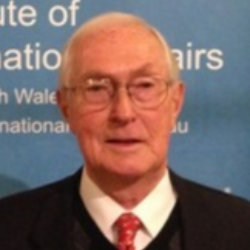GEOFF MILLER. Trump, Australia and the South China Sea.
November 13, 2016
The Trump victory has led to justified concern in Australia, as elsewhere, and few would carp at what seems to have been a successful and cordial talk between him and our Prime Minister. Its a good thing that Trump thought enough of the relationship to include Australia among the countries to receive an early call.
However, we need to be careful in considering our responses, even to a welcome approach. In characterising the conversation, Malcolm Turnbull talked about the enduring nature of the ANZUS Treaty and the Australian-American relationship, which he said transcended whoever was President or Prime Minister in our respective countries. He went on to talk about the defence relationship, how Trump intended a major expansion in US naval strength, and how that would mesh in with our own projected naval expansion (even though our new submarines arent going to be in service for decades). It seems that references to the South China Sea, and protecting freedom of navigation and commerce, may have come into the conversation.
The important point we need to keep in mind in dealings with the new US Administration, and the future President Trump in particular, is that we as yet have no idea what his priorities, and impulses, are going to be. In regard to our region, we know that he has spoken of retaliatory action against China for what he describes as its unfair trade and currency actions in regard to the US.
We also need to be aware that US talk of the need to protect freedom of navigation and commerce in the South China Sea is at least in part disingenuous. Unimpeded commercial traffic through the South China Sea is more important to China than to any other country, and China has taken no steps to impede it. It is undoubtedly concerned with activities by the US Navy in that region, as it is with US activities in other areas close to Chinese territory, but that is really a different issue, to do with the on-going and probably inevitable competition between the US, the established power, and China, the rising power, in the region.
Aware of this competition, what is the correct course for Australia? We certainly need not endorse all of Chinas actions. It is indeed incumbent on China to reach accommodations with the other countries, such as Vietnam and The Philippines, with claims in the South China Sea. But neither should we speak, publicly or privately, in terms which suggest that we are urging the US to undertake a provocative series of actions there, and would take part in such activities ourselves.
In the present circumstances, with a totally untried and unpredictable Administration about to take over in the US, and its relations with China likely to be stressed at least in the economic area, surely our prudent and constructive course is to seek to encourage the two great powers, both very important to us, to reach an accommodation, not to curry favour with the new US Administration by indicating that we are keen to join with them in whatever actions they might take in the South China Sea.
During the Obama Administration we resisted the temptation to do more than we ourselves judged to be in our national interests in that contested region. A wish to make our mark with the new team isnt a strong enough reason to change that very sensible position.
Geoff Miller was formerly Australian Ambassador to the Republic of Korea and Australian Ambassador to Japan. He was also Director General of the Office of National Assessments.
